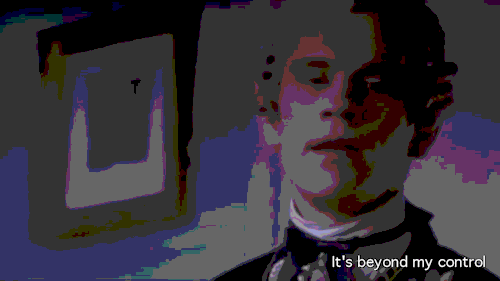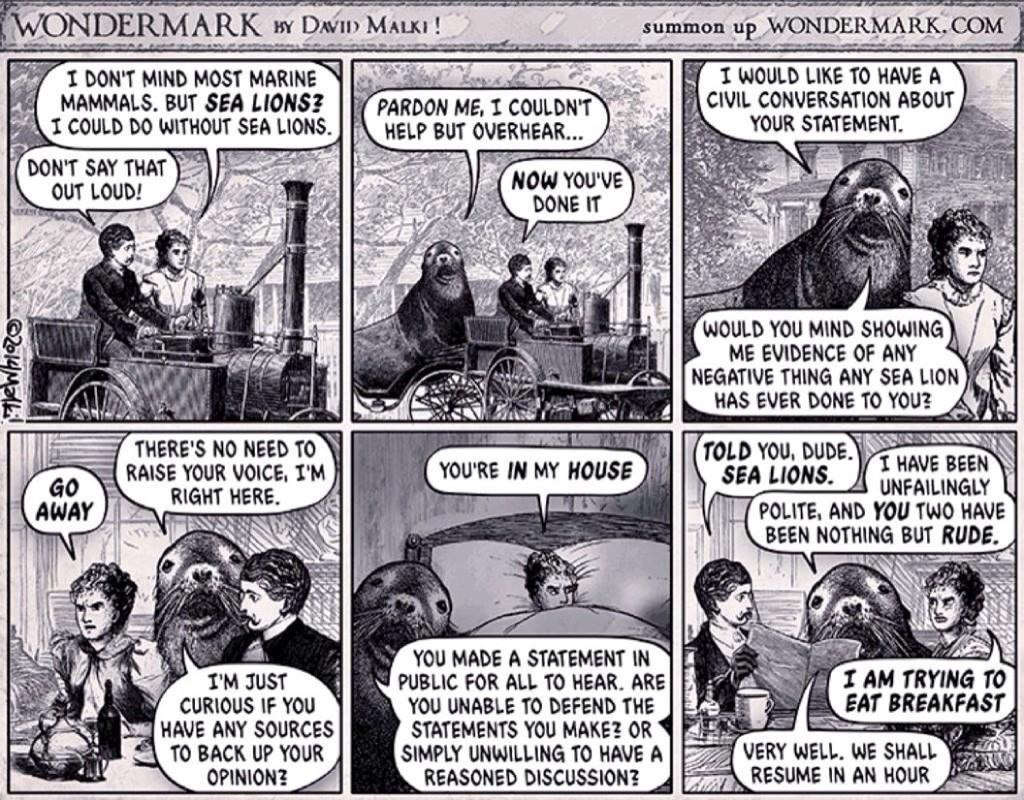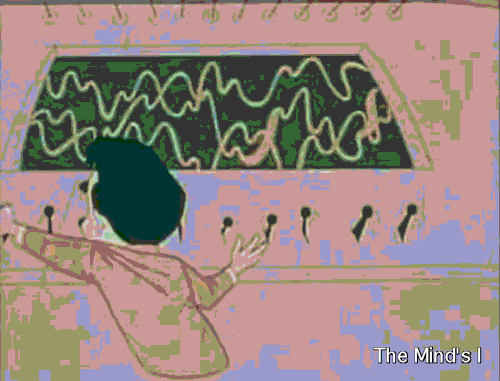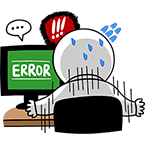I have been making gifs for a while so I decided to write a Medium article to start thinking about animated gif making.
The reaction gif

What I say when people ask me to stop being a perfectionist!
I have been making gifs for a while so I decided to write a Medium article to start thinking about animated gif making.
The reaction gif

What I say when people ask me to stop being a perfectionist!

“And we have a name for anyone who goes out of their way to find that old stuff: stalker. And we don’t really wanna work for, date, or befriend genuine stalkers.” Danah Boyd
We have been talking about issues of trust and networks over at #ccourses and I am in a deep reflective dive about all these issues. Particularly because I have been having some backchannel conversations with people who feel that what may be intended as ‘connecting behaviour’ by some is silencing them to the point of no longer participating.
This has made me reflect on the questions posed by reflection 3 on CT101: ‘How do you use these [web 2.0] accounts differently? Which are public and which are private? How do you make your choices and why?’ more deeply than the trivial ‘should I leave Twitter?’ or ‘is Facebook for me?’ We are encouraged to look at Danah Boyd’s article quoted in the introduction to this blog post.
I like the strategy she suggests: blog a lot and then your old stuff gets buried under your new stuff. Who can find it, anyway? And if they do: Stalker!
She suggests that even if privacy is dead, an assumption I question but will take as given here, we can still take control of our public persona. This, of course, is what digital storytelling can be all about. How do we tell the story of ‘me’ in the way we set up our spaces and the words, images, sounds we chose to associate with? And to Danah’s point how much of that is a purposeful choice? She tells us,
“Don’t whimper about how Google is destroying your reputation. Take control!”
This is sound advise if you are going to have a ‘mediated me’ but a little naive, in my view. She focusses her advise on how I narrate myself online – make sure comments are representative, treat audio and video the same as text, shape your story to your ends. When we look at the ‘send’ side of online communication it makes sense to say: ‘create a public Internet identity, maintain it, link to it, build it, love it, hug it, and call it George”.
It is on the dismissal and unexamined nature of her advise on the ‘receive’ side of communication that the article falls down. We are to expect ‘unexpected audiences’ and plan for that; and let’s not be so idiotic as to think about the dangers of a mediated self.
“Every advice column I’ve read warns people of the dangers of living online. I think that this is idiotic. People need to embrace the world we live in and learn to work within its framework. Don’t panic about being public – embrace it and handle it with elegance.”
Actually, no. I do not ‘need to embrace’ the world I live in, I can also choose to change it.
What I see around me is that there are real dangers, choosing to live online can destroy reputations without a given individual being able to exercise any control. The more I focus on the ‘receive’ side of online communication, the more I see how limited our choices are. Expecting ‘unexpected audiences’ is really not enough.
What happens when the unwanted attention shapes or destroys a reputation? What happens when the unwanted attention does not allow my freedom of expression? What happens when the spiral of silence kicks in? How do individuals deal with ‘posses’ who travel together and may choose not to like what you write in e-mob style?
The more choices to be ‘public’ one makes, the more likely one will find people who disagree with one’s world view and are unable to engage meaningfully with disagreement. The open web does not come with a built in facilitator to teach people the skills of systemic dialogue. The conversation ‘out there’ makes me despair for us humans at times. Take this video as an example.
A beautiful animated poem about the impact of trolling behaviour. A few things struck me on watching: the fact the ‘The Troll’ in the film is not a behaviour but a person to be blamed, the tone of the comments about the video, the final sad and only little option left to the person being trolled.
Being on the receiving end of unwanted attention when I chose to shape a public mediated self is a profound and complex issue. Your troll is my friend, your collaborator is my stalker, and your freedom to express a view that somebody is a jerk can destroy a life. Sometimes the behaviours are clear cut and there are laws to protect us, but more often than not it is shades of grey and in the eye of the beholder. There are examples both sides of serious casualties. Recently Brenda Leyland was found dead in the UK – a twitter troll to some, a loving mum to others. Today I read about Kathy Sierra, a tragic story of a life fundamentally changed by unwanted attention that led to discussion about a ‘code of conduct’ for bloggers. What stays with me is her bravery to use the public forum to make issues known and these words,
“I have cancelled all speaking engagements. I am afraid to leave my yard, I will never feel the same. I will never be the same”
I have never heard about any ‘blogger’s code of conduct’ before – so clearly not something that got taken up widely. Is it really enough that I have the option to ‘mute’ or ‘block’ or ‘disable comments’? It occurs to me that all these options are not dissimilar to a rape victim being told to dress more modestly or not walk home alone after dark. The burden of responsibility rests on the ‘victim’ not the ‘persecutor’. Reading the comments on the trolling video, I am also struck by how the communication follow the classic drama triangle in Transactional Analysis. The victim get attacked by the persecutor as rescuers come in to defend the victim. The problem is that the roles just cycle around and the game keeps going ad nauseam.
Yes, I use the tools at my disposal to tailor my social media presence to learning. I choose who I interact with. Do I feel this is enough? My experiences over the last few days have left me painfully aware of the dangers Danah Boyd dismisses as idiotic. How do we teach/learn the kind of communication that allows us to step out of drama triangle? Unwanted attention is a side of ‘public’ that needs us to deeply reflect about the dangers of public not dismiss them. Ignoring them won’t make them go away.
We need more meaningful dialogue and less shallow answers. Listicles that simplify the complexities of interacting in mediated environments either for fun or learning or both, lessen our human worth and keep our fears underground. Read Kathy Sierra‘s last post on her blog for engagement with complexity or Alec Couros strategies to deal with identity theft. We can engage with difficulty and explore shared strategies for coping and change.
Will my experiences change my private-public balance? I don’t know yet. I am reminded of a premise from appreciative inquiry and wonder how it might apply in this situation:

We seem happy to trade our privacy for a cookie, so may be Danah is right that a concern for privacy is a thing of the past…

The mind is working overtime to create it!
I am familiar with the syllabus but I am choosing to go through it again with a focus on creating a domain of my own and working through what it means to evolve the ‘story of me’ in this new space for myself. I have always had help with the spaces I own or have used spaces that are designed by others. I want to struggle with this being my own ‘sys admin’ for a bit, create my personal cyberinfrastructure one step removed from third party design. I have not done so up till now because I have had an inkling that Stephen Downes is right when he says,
I have no illusion that hosting my own domain and server and all the rest of it will free from such fecklessness [of third parties]. It simply moves it back a level.
But this does not mean that I should not go through the creation process to learn how to move it ‘back a level’ even if, due to laziness, I decide to go back and hangout in Tumblr until Yahoo ruins it beyond recognition.
So, my game plan is to experiment with this domain and deepen my knowledge of digital storytelling tools. The secret plan? to get to the end of this and find a voice as an artist,
I had no idea what kind of artist I was or even wanted to continue becoming. I just knew that I loved making art. I also knew the feeling that making my work gave me. That feeling has never left me, in fact, it is the same one that I know from my childhood. What I wasn’t doing was connecting that inner bliss with understanding my personal goals and intentions
I know exactly what Ryan means in relation to my writing. I cannot not do it. My love for my own ‘drive to express myself in more ways than I could count’ has seen me through some really tough times. Yet, I never defined myself as an artist. When I started DS106 last year, I was just learning how to use fun toys and make artefacts. I was not making art. I became fascinated by the question ‘what makes a story?’ I am curious as to what is the minimum we can offer in any medium to earn the label ‘storyteller’. I am a psychologist, an academic, an open educator, a wife, a step mum, a dog lover….but and artist? Meh.
That feeling I get when a sentence is crafted just so or when that animated gif is so awesome I could watch it loop forever? I think that is where my artist lives and may be it is time it came out to play in the open.
Week one asks that we,
“Assess your skills with a variety of digital storytelling tools – Shooting, editing photos. Manipulating text and image in a layered fashion. Recording and editing audio (this could be music, voice, natural sound, found sound, remixed sound). Shooting and editing video. Creating animations (this includes creating GIFs from loops of found video). What tools have you used to do your work? Which ones are you most comfortable with and why? Which ones are you not and would like to learn to use better? In a blog post, answer these questions as well as embed a piece of media you’ve created and describe it.”

Here is my initial self-assessment:
Shooting photos: suck at it, need to learn about the technical stuff about taking photos.
Editing photos: Am pretty awesome here, I love doing creative edits in Photoshop. Always up to learn more.
Manipulating text and image in a layered fashion: Okay, always struggle. Can do better.
Recording and editing audio (this could be music, voice, natural sound, found sound, remixed sound): Meh! not bad.
Shooting and editing video: Meh! not bad.
Creating animations (this includes creating GIFs from loops of found video): Need to learn the basics of animations, I am pretty good at making them animated gifs 🙂
What tools have you used to do your work?
iMovie GarageBand Photoshop CC Gimp ScreenFlow MpegStreamClip and various apps and online tools.
Which ones are you most comfortable with and why?
I regularly use the ones above, I can do stuff at what I would label and intermediate level, I want to get awesome at Photoshop.
Which ones are you not and would like to learn to use better?
The new GarageBand. I was so used to the old one, I have thought to go back to the old version but that is silly.
I need to learn the basics of animation for any tool. I just experiment but have never learnt building blocks.
Kinetic typography – I would love to find and learn a tool that would enable me to do this easily. I tried Letters in Motion once. Spent a day making a video and I am still looking for the rendered version in my computer – some glitch that means you can create on iPad but can only view in iTunes…
The DS106 Good Spell
Every Sunday at 8pm UK time John Johnston and I do a talk show on DS106Radio – which should always be heard on GiFTV in my view!
I have embedded below one of the episodes. You can hear more at EduTalk
Audio has been a big surprise since starting DS106 a year ago. I did not particularly want to learn it and now I love doing DS106 radio and creating audio. Could do with learning the basic building blocks broadcasting – I just wing it!